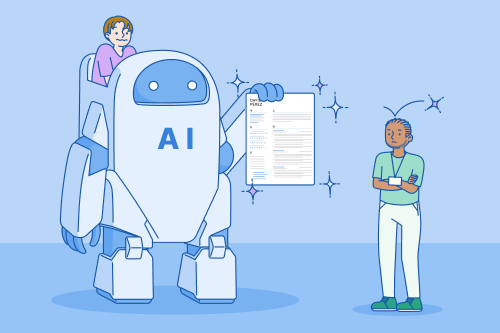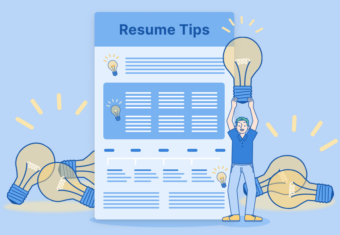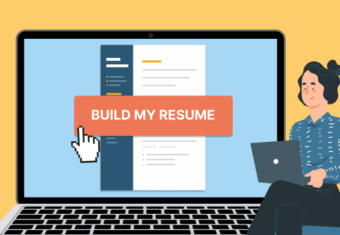From helping applicants take professional headshots to writing resumes using ChatGPT, generative AI software has added a modern twist to the job hunt.
But with all the buzz, is the hiring world on board with this shift?
According to Resume Genius’s Hiring Trends Survey, 1 out of 2 hiring managers see “AI-generated resumes” as one of the most critical red flags that would make them less likely to hire a candidate.
To get a deeper understanding of this topic, we asked six hiring and career experts what goes through their minds when they receive resumes that are (sometimes obviously) written by AI and shared their thoughts below.
1. AI-generated resumes are frowned upon in creative fields
Geoffrey Scott, Hiring Manager at Resume Genius, offers a word of caution, especially for those applying for writing positions. He believes that if it’s evident a resume is AI-generated, it won’t reflect well on the candidate.
“If you’re going for a writing job and I catch even a hint that AI helped with your resume (or worse, wrote your cover letter for you), that’s a big red flag,” he warns.
For roles that aren’t about writing, like a technical SEO position, I’m a bit more forgiving. But if it’s super obvious you used AI to make your resume, that’s not a good look and you’re not actually using AI the right way. If you’re going to use AI, be smart about it — use it as an aid, not a replacement for actual effort.
Geoffrey Scott, Hiring Manager at Resume Genius
Joie Karcher, Founder of Your Network Now, views AI as one of many tools available to job seekers. For her, applicants can train platforms like ChatGPT to capture their individual personalities and continually tweak their resumes to appear less generic.
As a recruiter who’s received thousands of resumes, she says, “I truly don’t care if you’re using AI to write your resume. Why wouldn’t we use tools that are at our disposal right now to make our lives easier?”
While Karcher agrees that creative roles involving writing should stay off AI, she has a solution:
The area I would suggest individuals get very confident with is teaching ChatGPT to use your own tone, personality, and style, so that it’s not canned information that’s cut and pasted into a resume.
Joie Karcher, Founder of Your Network Now
2. AI can’t personalize content well
Paula Mathias-Fryer, Senior Director at SLO Partners, says, “Relying solely on AI for creating your resume may not be the best approach.”
“When a resume appears to be entirely AI-generated, I tend to discard it. I prefer candidates who use their own words and skills to tailor their resumes.”
Mathias-Fryer recommends crafting your resume first and then using AI for fine-tuning, as a completely AI-generated resume can seem “overly flawless and exaggerated,” which might not resonate well with HR professionals.
Fine-tuning a resume for job seekers can look like making minor adjustments to the language, ensuring resume formatting consistency, or optimizing for specific keywords.
However, the core of the resume should still come from the individual’s unique experiences and career-related achievements.
3. AI resumes frequently generate false information
For many job seekers, the allure of AI-generated resumes lies in their promise of saving time and effort.
Chris Villanueva, Founder of Let’s Eat, Grandma, points out those benefits for job seekers, especially “those juggling their current jobs or going through multiple rounds of interviews.”
For example, making a ChatGPT cover letter or resume can take a few seconds or minutes, when traditionally it can take between one to eight hours to make your own resume from scratch.
However, he also cautions against relying too heavily on AI, emphasizing that it might output false information and can’t replace human connection in job hunting. He says,
If you don’t take the time to think about your skills and how they match a job, you might find yourself wondering why you’re applying in the first place, or at best, end up with a vanilla resume.
Like Villanueva, Flex HR‘s HR Consultant Jennifer Preston, also raises ethical concerns about the accuracy and authenticity of AI-generated resumes.
She says that job seekers “who dig deep to capture the best part of themselves and the experiences that define who they are” help separate a “prescriptive” AI-generated resume from a human-crafted one.
Preston details how she recently hired two candidates who stood out because of the personal stories on their resumes and cover letters describing how they tackled adversity and took on unusual life challenges. Had they gone the AI-written route, their stories wouldn’t have seemed as believable.
She adds, “The beauty of recruitment is building relationships with a candidate, a person, not a robot. I don’t care to know how a computer values your experiences. The words and language a candidate chooses reveal so much more about who they truly are.”
4. AI muffles an applicant’s communication skills
Matthew Warzel, President of MJW Careers, also has mixed feelings about AI-generated resumes but emphasizes how a resume can showcase excellent communication, a highly in-demand soft skill.
“A well-crafted resume and cover letter often provide valuable insights into a candidate’s communication skills, creativity, and authenticity,” he says.
During a hiring process, he recalls how one exceptionally well-structured resume caught his attention. It was tailored perfectly with keywords and a format aligning with the job’s requirements and efficiently highlighting the candidate’s qualifications.
“But it felt somewhat generic, lacking a personal touch,” Warzel says. “There was no glimpse into the candidate’s personality or any unique experiences.”
This realization led to an extended interview. “While AI-generated resumes can be efficient in initial screenings,” he says, “they don’t always capture the candidate’s full essence. This experience reinforced me to look beyond the resume to assess the person behind the qualifications.”
Warzel believes that while generative AI software like ChatGPT or Bing can be a helpful tool, it should “complement, not replace, the human touch in the hiring process.” He adds,
AI may not fully capture the candidate’s personality or the nuances of their career journey. Traditional resumes, on the other hand, tend to offer a more holistic view of the candidate, including their communication style and personal touch.
Matthew Warzel, Founder of MJW Careers
Should you use AI to make your resume?
Across the board, hiring experts largely seem to be in agreement about AI technology. AI chatbots are a powerful tool, and if used wisely, can help you land a job.
But a well-written resume is more than a collection of skills and experiences — it’s a reflection of your journey, ambitions, and identity.
Resume Genius’s Hiring Trends Survey found that 1 out of 2 hiring managers see “AI-generated resumes” as one of the most critical red flags that would make them less likely to hire a candidate.
While you can use an AI resume generator to proofread your resume or provide a starting point, it’s still essential to review the finished product to make sure it sounds professional and authentic to your own experiences.
Preston says, “Using AI for ideas is one thing, having AI generate your entire resume or cover letter is another. Take the time to be you, your true, unequivocal self, and do the hard work now. It will land you the right role at the right company, at the right time, for, hopefully, a long time.”
Sources
About Resume Genius
Since 2009, Resume Genius has combined innovative technology with leading industry expertise to simplify the job hunt for people of all backgrounds and levels of experience.
Resume Genius’s easy-to-use resume builder and wide range of free career resources, including resume templates, cover letter samples, and resume writing guides, help job seekers find fulfilling work and reach their career goals. Resume Genius is led by a team of dedicated career advisors and HR experts and has been featured in The New York Times, Forbes, CNBC, and Business Insider.
For media inquiries, please contact us.














